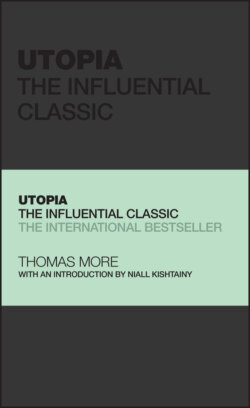Читать книгу Utopia - Sir Thomas More, Thomas More, William Roper - Страница 9
THE ISLAND OF UTOPIA
ОглавлениеUtopia takes the form of a traveller's tale told by a seafarer who once chanced upon the island of Utopia. During a series of dialogues with various interlocutors the explorer tells of life on the happy island and makes scathing critiques of English society. The story starts with real events and with More himself, who begins by telling of his mission to Flanders and his journey to Antwerp.
The fiction starts when More recalls one day stepping into the street after Mass and seeing Peter Giles talking to a sun‐beaten mariner. Giles tells him that the man, Raphael Hythloday, is a traveller with amazing tales of far‐off lands. The men retire to a garden and Raphael tells More and Giles about his travels generally, his views on the state of contemporary Europe, and about the distant nation of Utopia.
In Raphael's description of Utopia, we encounter a society that in some of its surface features resembles England. For example, like London, Utopia's capital city of Amaurot lies on a hill by a tidal river with a stone bridge over it. But at a deeper level Utopia is an inversion of the societies of England and Europe. In Utopia property is held in common and there is no money. Whenever a family needs food or clothes, the head of the household goes to the city warehouse and takes what is required. The Utopians are a disciplined, frugal people devoted to the higher pleasures of conversation and learning. They have no reason to take more goods than they need, having no desire to flaunt their possessions. Their sturdy houses have no locks on the doors and are exchanged every ten years by lot.
One of the most memorable Utopian customs, used to show the Utopians' rejection of opulence, is the making of chamber pots out of gold and the public shaming of wrongdoers by placing gold crowns on their heads. Pearls and diamonds are given to the children for playthings; they discard the baubles as they grow up.
In Utopia everyone works in the fields or at handicrafts, unlike in Europe where societies are dragged down by the wasteful extravagance and idleness of noblemen and their retainers. Because all lend a hand and there is no need for luxuries, the Utopian working day is short and there is plenty of time left over to engage in learning and contemplation. There are only a few laws, simple enough for everyone to understand, and no lawyers. The Utopians come together for their meals, during which a morally improving text is read out and discussed. After dinner, the people play music or converse in their gardens.
Utopia ranges over many questions including: war (the Utopians hate the pursuit of military glory that Europe's princes lust after); the qualities of priests (the Utopians' priests are few in number and truly pious, unlike those in Europe); the functioning of politics (aimed at avoiding tyranny); and marriage customs (divorce is allowed in special circumstances and infidelity is punished). But the communal principle of Utopia is the big theme that encompasses all of these, and at two places in the book Raphael pauses his travelogue to deliver tirades about the impossibility of justice in societies based on private property. More and Giles raise objections, arguing that without private property society could not function because people would not bother to work. Raphael is undaunted. The rich will always exploit the poor, he says, through private fraud and by capturing the law. Policies to mitigate these defects will never have much of an effect while there is still private property. Raphael hails Utopia as the best commonwealth because with everything held in common everyone is guaranteed their subsistence. The abolition of property and money ends fraud, murder, disorder, and anxiety. What would stop the adoption of utopian arrangements, then? Human pride, which measures fortune by the ill‐fortune of others.
